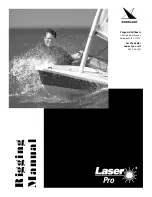
SAFETY-9
the exhaust of all engines and generators as
well as any open
fl
ame device produce CO
and the same precautions should be taken
regardless of the type of fuel.
HOW A PERSON IS AFFECTED BY
CARBON MONOXIDE
When breathed, carbon monoxide is ab-
sorbed by the lungs and reacts with the
blood hemoglobin to form carboxyhemo-
globin, which reduces the oxygen carrying
capacity of the blood. The result is a lack of
oxygen for the tissues with the subsequent
tissue death and, if prolonged, death of the
individual. Carbon monoxide in high concen-
trations can be fatal in a matter of minutes.
Even lower concentrations must not be
ignored because the effects of exposure
to CO are cumulative and can be just as
lethal. Certain health related problems and
age increase the effects of CO. People, who
smoke or are exposed to high concentra-
tions of cigarette smoke, consume alcohol or
have lung or heart disorders are particularly
susceptible to an increase in the effects from
CO. However, the health of all of the boat’s
occupants should be considered. Physical
exertion accelerates the rate at which the
blood absorbs CO. The early effects of CO
poisoning are easy to overlook because they
are similar to the effects of other boating
related stresses such as eye strain, fatigue,
sun exposure, seasickness, or alcohol con-
sumption. But as the concentration of CO in
the air increases, it has increasingly adverse
effects on your health.
One or more of the following symptoms
can signal the adverse effects of carbon
monoxide accumulation. The order of this
list is generally the sequence of symptoms.
However, the number of symptoms and the
order of appearance may change for differ-
ent people:
Watering and Itching eyes
Flushed Appearance
Throbbing temples
Inattentiveness
Inability to think coherently
Ringing in the ears
Tightness across the chest
Headache
Drowsiness
Incoherence
Nausea
Dizziness
Fatigue
Vomiting
Collapse
Convulsions
•
•
•
•
•
•
•
•
•
•
•
•
•
•
•
•
Summary of Contents for 35MY
Page 1: ......
Page 6: ...INTRODUCTION 6...
Page 8: ...INTRODUCTION 8...
Page 12: ...INTRODUCTION 12...
Page 28: ...35MY Getting Familiar 8...
Page 38: ...35MY Getting Familiar 18...
Page 58: ...SAFETY 18...
Page 64: ...SYSTEM OPERATIONS 6...
Page 66: ...SYSTEM OPERATIONS 8...
Page 68: ...SYSTEM OPERATIONS 10...
Page 86: ...SYSTEM OPERATIONS 28...
Page 88: ...SYSTEM OPERATIONS 30...
Page 92: ...SYSTEM OPERATIONS 34...
Page 96: ...SYSTEM OPERATIONS 38...
Page 106: ...SYSTEM OPERATIONS 48...
Page 118: ...SYSTEM OPERATIONS 60...
Page 120: ...SYSTEM OPERATIONS 62...
Page 122: ...SYSTEM OPERATIONS 64...
Page 124: ...SYSTEM OPERATIONS 66...
Page 128: ...SYSTEM OPERATIONS 70...
Page 132: ...SYSTEM OPERATIONS 74...
Page 134: ...SYSTEM OPERATIONS 76...
Page 136: ...SYSTEM OPERATIONS 78...
Page 152: ...OPERATION 6...
Page 160: ...GLOSSARY 6...
Page 162: ...GLOSSARY 8...
Page 163: ...GLOSSARY 9 MAINTENANCE LOG DATE MAINTENANCE PERFORMED HOURMETER...
Page 164: ...GLOSSARY 10 MAINTENANCE LOG DATE MAINTENANCE PERFORMED HOURMETER...
Page 166: ...GLOSSARY 12...
Page 172: ...GLOSSARY 18...
Page 175: ......
Page 176: ......
Page 177: ......
Page 178: ......
Page 179: ......
Page 180: ......
Page 181: ......
Page 182: ......
Page 183: ......
Page 184: ......
Page 185: ......
Page 186: ......
Page 187: ......
Page 188: ......
Page 189: ......
Page 190: ......
Page 191: ......
Page 192: ......
Page 193: ......
Page 194: ......
Page 196: ...35 MOTOR YACHT INTERIOR...
Page 197: ......
Page 198: ...35 MOTOR YACHT Mechanical Arrangement Detail A...
Page 199: ...35 MOTOR YACHT Mechanical Arrangement Detail B...
Page 200: ...35 MOTOR YACHT Mechanical Arrangement Detail C...
Page 201: ......
Page 202: ......
Page 203: ......
Page 204: ......
Page 205: ......
Page 206: ......
Page 207: ......
Page 208: ......
Page 212: ......
Page 213: ......
Page 214: ......
Page 215: ......
Page 216: ......
Page 217: ......
Page 218: ......
















































